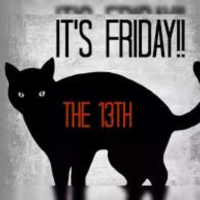Friday the 13th—just the mention of it can send chills down the spine of many. This infamous day has long been associated with bad luck, mysterious happenings, and even dark omens. But why is this particular day viewed with such fear? In this article, we’ll dive deep into the history, origins, and cultural significance of Friday the 13th. Along the way, we’ll debunk myths, explore its presence in pop culture, and uncover why people continue to be wary of it. Let’s unravel the mystery behind Friday the 13th and see if there’s any truth to the superstition! Is it real or unreal let’s check.
What is Friday the 13th?
Friday the 13th refers to a day in the calendar when the 13th day of the month falls on a Friday. It’s known in Western superstition as an unlucky day, and this fear has been perpetuated for centuries. But where does the fear originate from, and why does it continue to exist in modern times?
Friday the 13th has gained a notorious reputation, not just as a random unlucky day but as a date imbued with ominous implications. From avoiding travel to steering clear of major decisions, many people tend to alter their plans to avoid catastrophe on this date.
The Historical Origins of Friday the 13th Superstition
The superstition surrounding Friday the 13th likely comes from two elements: Friday and the number 13, both of which were considered unlucky separately.
Why Friday?
Historically, Friday was often seen as an unlucky day in various cultures. For instance, in Christian tradition, it is believed that Jesus Christ was crucified on a Friday, which led to the association of Fridays with ill fate. This belief is known as “Good Friday” but for those in the superstitious crowd, it represents a day of sorrow and mourning. Additionally, executions were often carried out on Fridays in medieval times, further linking this day to bad luck.
Why the Number 13?
The number 13 has been viewed with suspicion for thousands of years. One possible origin of its unluckiness is from Norse mythology, where 12 gods were invited to a feast in Valhalla, but Loki, the trickster god, arrived as the 13th guest, leading to chaos and death. This story has contributed to the superstition around the number 13 being associated with bad fortune.
In some numerology beliefs, 12 is considered a “complete” number: there are 12 months in a year, 12 zodiac signs, 12 apostles of Jesus, and 12 gods of Olympus. Therefore, 13 was seen as going beyond completeness into something irregular, disorderly, or ominous.
Combining the Two: Friday + 13 = Bad Luck?
By the late 19th century, the fears surrounding Friday and the number 13 merged into one superstition: Friday the 13th. Together, these two concepts formed one of the most pervasive superstitions in the Western world.
Friday the 13th in Popular Culture
Pop culture has been instrumental in cementing Friday the 13th as a day of bad luck. From books to movies, the day has become a symbol of fear, and no conversation about it is complete without mentioning the iconic “Friday the 13th” horror film franchise.
The “Friday the 13th” Horror Film Series
The “Friday the 13th” movies, which debuted in 1980, are an iconic horror series centered around Jason Voorhees, a masked killer who terrorizes a summer camp. The films became synonymous with superstition, using the date as a foundation for tales of terror. The first movie, in particular, played into the superstitions surrounding the day, turning it into a pop-culture phenomenon. 
The series’ success further fueled people’s fascination and fear around the date, making Friday the 13th a permanent part of modern mythology.
Modern-Day Fear of Friday 13th: Friggatriskaidekaphobia
Believe it or not, there’s an actual term for the fear of Friday the 13th—Friggatriskaidekaphobia. Derived from Frigg (the Norse goddess for whom Friday is named) and triskaidekaphobia (the fear of the number 13), this condition highlights how deeply superstition is ingrained in people’s minds.
Even today, many people are reluctant to travel, get married, or start new ventures on Friday the 13th, despite a lack of evidence supporting any actual increase in misfortune. In some cities, buildings skip the 13th floor altogether, going straight from the 12th to the 14th, a testament to how seriously some people take this superstition.
Famous Events That Happened on Friday the 13th
Though most fears around Friday the 13th are based on superstition rather than fact, there have been notable incidents that occurred on this day. For instance:
- The Knights Templar Arrests: On Friday,13 October 1307, the Knights Templar, a powerful and wealthy group of Christian warriors, were arrested by order of King Philip IV of France. Many were tortured and executed, and the event is often cited as one of the potential origins of Friday the 13th’s bad reputation.
- Cyclone Hits Bangladesh: On Friday,13 November 1970, a devastating cyclone struck Bangladesh, killing over 300,000 people. This natural disaster is often cited as an example of the bad luck associated with Friday the 13th.
Debunking the Myths: Is Friday the 13th Unlucky? BUT AS PER ME IT’S NOT UNLUCKY
So, is Friday the 13th really unlucky, or is it just a day filled with superstitions? Modern science and research suggest that there’s no evidence to back up claims of bad luck on this day. Studies on accident rates and hospital visits on Friday the 13th have shown little difference compared to other days.
The belief in the unluckiness of Friday the 13th is purely a psychological phenomenon. When people are already convinced that something bad is likely to happen, they’re more likely to notice or attribute negative events to the date.
How to Embrace the Day: Turning Superstition into Fun
Instead of fearing Friday the 13th, why not embrace it as a day of fun and celebration? Many people now see the day as a chance to throw themed parties, watch horror movies, and enjoy the spooky atmosphere. After all, superstitions only have power if you give them power!
By shifting the perspective and using Friday the 13th as a day to confront and laugh at fears, people can take back control of old myths and outdated beliefs. You could even turn the day into a positive tradition by starting a new project or trying something adventurous.
Conclusion
While Friday the 13th has a long history of being associated with bad luck and fear, the truth is that there’s no concrete evidence to suggest it’s any unluckier than any other day. The superstition stems from ancient beliefs, cultural traditions, and pop culture influences, but ultimately, it’s all in how you view it. Whether you choose to fear or celebrate the day, one thing is certain—Friday the 13th is more about the stories we tell ourselves than any actual doom.
Embrace the date, enjoy the thrill of the superstition, and remember, sometimes a little mystery makes life more interesting!
Rest I would suggest that there is no such superstition so please don’t believe such things.





